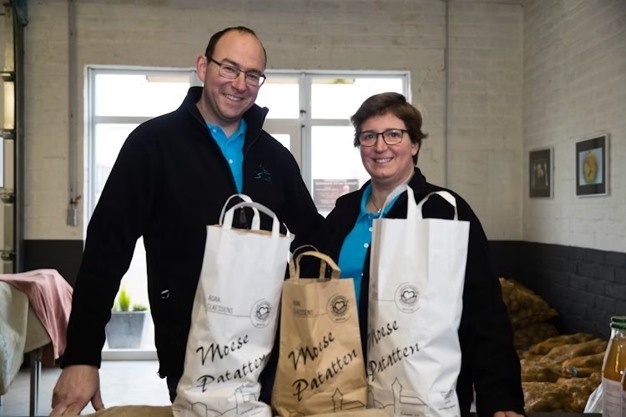The difficulties of the Belgian potato season were once again evident at Interpom last week. Adverse weather conditions and disease pressure caused significant challenges, but despite lower yields, the harvest is now complete. "It's not as relaxed as it was 10 to 15 years ago," says Stijn Windey of Agra Claessens. "You simply cannot afford to make mistakes anymore. It takes every effort to get a good product from the ground, and even then, you have to accept what you get."

Stijn and his wife, Greet, established their farm relatively recently. In 2005, they took a leap of faith when a neighboring farm came up for sale. Initially, they focused on ornamental cultivation and early potatoes in greenhouses but eventually expanded into outdoor potato farming. Although they have gained experience over the years, this season stands out. "It was so wet," Stijn reflects. "I haven't seen anything like it in my career. We always start the year with early potatoes, Moese Patatten, in the greenhouse, and those did well. A warm spring helped the potatoes grow nicely, and the first outdoor harvests under protection also went smoothly."
"However, with the mid-to-late season potatoes, we started seeing water damage," explains Stijn, who cultivates about 10 hectares of potatoes outdoors. "The quality of the harvested potatoes was good, but many were lost due to spring rains. This was a widespread issue in Belgium and the Netherlands, though regional differences were significant. I've heard that neighboring countries like Germany and France fared better overall. I estimate that we harvested about 30% less than in previous years. Lighter soils coped better, but here in the Scheldt Valley, our flat soils are highly prone to water stagnation, which causes significant damage depending on planting timing."

Consumer preferences for smaller packaging
Stijn points to heavy rains in late May and early June as a major factor. "Early planters faced heavy showers around that time, causing the potatoes to rot in the ridges. Those who planted later escaped some of this damage but had to harvest earlier, especially on heavy clay soils where leaving the potatoes until November isn't an option. We planted in the second half of May, which was early for this year. Unfortunately, some areas were underwater, making replanting impractical. If an entire field is affected, you can replant, but it's much harder when damage is scattered across corners and patches. We decided to leave it as it was and harvested what grew. What we did harvest matured well, but the yields were lower."
In addition to selling directly to consumers, Agra Claessens supplies potatoes to retailers, early-market wholesalers, and specialty shops. They handle everything in-house, avoiding dependency on contracts. "This gives us full control, and it's working well," says Stijn. However, he notes a shift in consumer purchasing habits.
"In supermarkets and even at greengrocers, demand for large packages has dropped. Where we used to sell 10 kg bags, the maximum now is 5 kg—or even better, 2.5 kg. People are buying what they need for immediate use. Smaller families also prefer smaller portions. We've adapted by changing our packaging to meet this demand."

Adapting to bigger challenges
When asked if these growing challenges make him doubt the future, Stijn is resolute. "Yes, it's getting harder, but we'll never stop. You can't change the soil or the climate, so you adapt. Our heavy clay soils made planting particularly difficult this year. Some areas were so wet that I sank up to my waist. I've never experienced that before. This struggle lasted all season, and crop protection was a constant battle. We had to switch to wider wheels because regular spray wheels just couldn't handle the conditions. This season will go down in the books—not just for us, but for many others."
Stijn highlights the importance of precision and resilience. "Mistakes aren't an option anymore. You need the right product at the right time. Potato farming is tough, but if you're passionate about it, it's rewarding. We also grow beetroot, which is a niche product for us. It's not widely cultivated, but it's popular with customers, and sales are strong, so we'll keep it in our rotation. Despite there being less sensitive and more productive options, we stick with it because it's something we enjoy."

Has Stijn ever considered switching to something else? "You always think about the future, but no, not anytime soon. We are exploring intermediate crops that offer more peace of mind. For instance, we're experimenting with sunflowers and angelica. They're interesting crops, and we plan to continue developing them in the coming years."
For more information:
Stijn Windey
Agra Claessens
Bootdijkstraat 23A
9220 Moerzeke, Belgium
Tel: +32 472 47 51 38
[email protected]
www.agraclaessens.be
